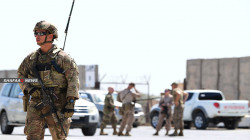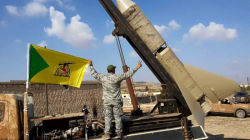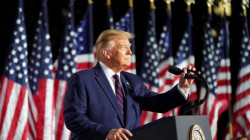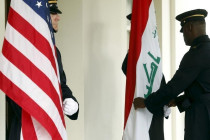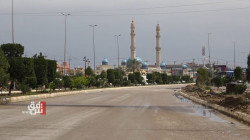Trump's First 100 Days: Limited gains, global repercussions, and the Iraqi dimension
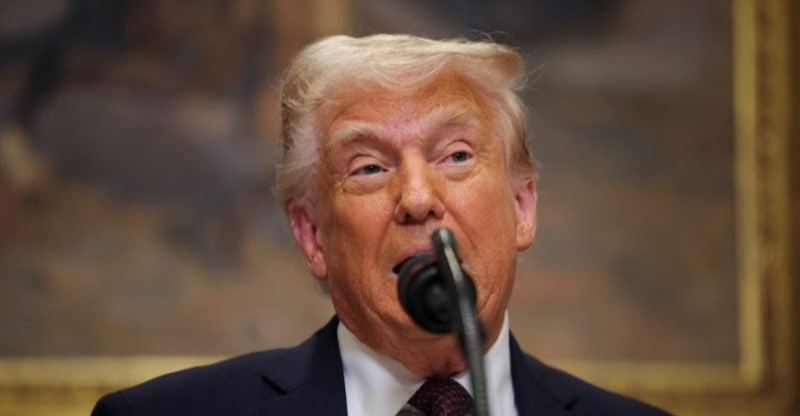
Shafaq News/ More than 100 days have passed since Donald Trump assumed the presidency of the United States for a second term, marked by a mix of aggressive foreign policy maneuvers and unmet campaign promises.
Chief among these pledges was the resolution of the Gaza and Ukraine conflicts, both of which remain unresolved. Yet, despite notable shortcomings, Trump has registered some successes, particularly in exerting pressure on Iran to return to the negotiating table, according to analysts.
While Trump's policies have triggered ripple effects globally, their direct impact on Iraq remains secondary and largely indirect. Observers emphasize that developments affecting Iraq are primarily a result of broader global shifts, such as the drop in oil prices following Trump's imposition of tariffs, sparking fears of a financial crisis in Baghdad given Iraq's heavy reliance on oil revenues.
Maximum Pressure Returns
Trump's second term began with the familiar strategy of "maximum pressure," aiming for tangible economic outcomes. According to Kamel Al-Zughoul, a researcher in American affairs, "Trump applied this policy across a broad front—Greenland, Panama, the Middle East, Russia, and Ukraine—even pressuring Europe, achieving varying degrees of success," he told Shafaq News.
Al-Zughoul noted that Trump succeeded in compelling the European Union to raise its defense spending to 5% of GDP, a move Brussels is currently considering. In the Middle East, his pressure campaign successfully drew Iran into preliminary negotiations, creating what Al-Zughoul described as "a safer economic environment."
Nonetheless, Trump's broader pressure strategy has faltered against two major powers. "Trump failed to pressure China and Russia," Al-Zughoul explained. China retaliated with equivalent tariffs, harming the U.S. economy, while Russia exploited the resulting void, intensifying its assault on Kyiv.
"The only arena where Trump might claim a partial success is Gaza," Al-Zughoul added, suggesting that a de-escalation there could offer Trump a diplomatic talking point.
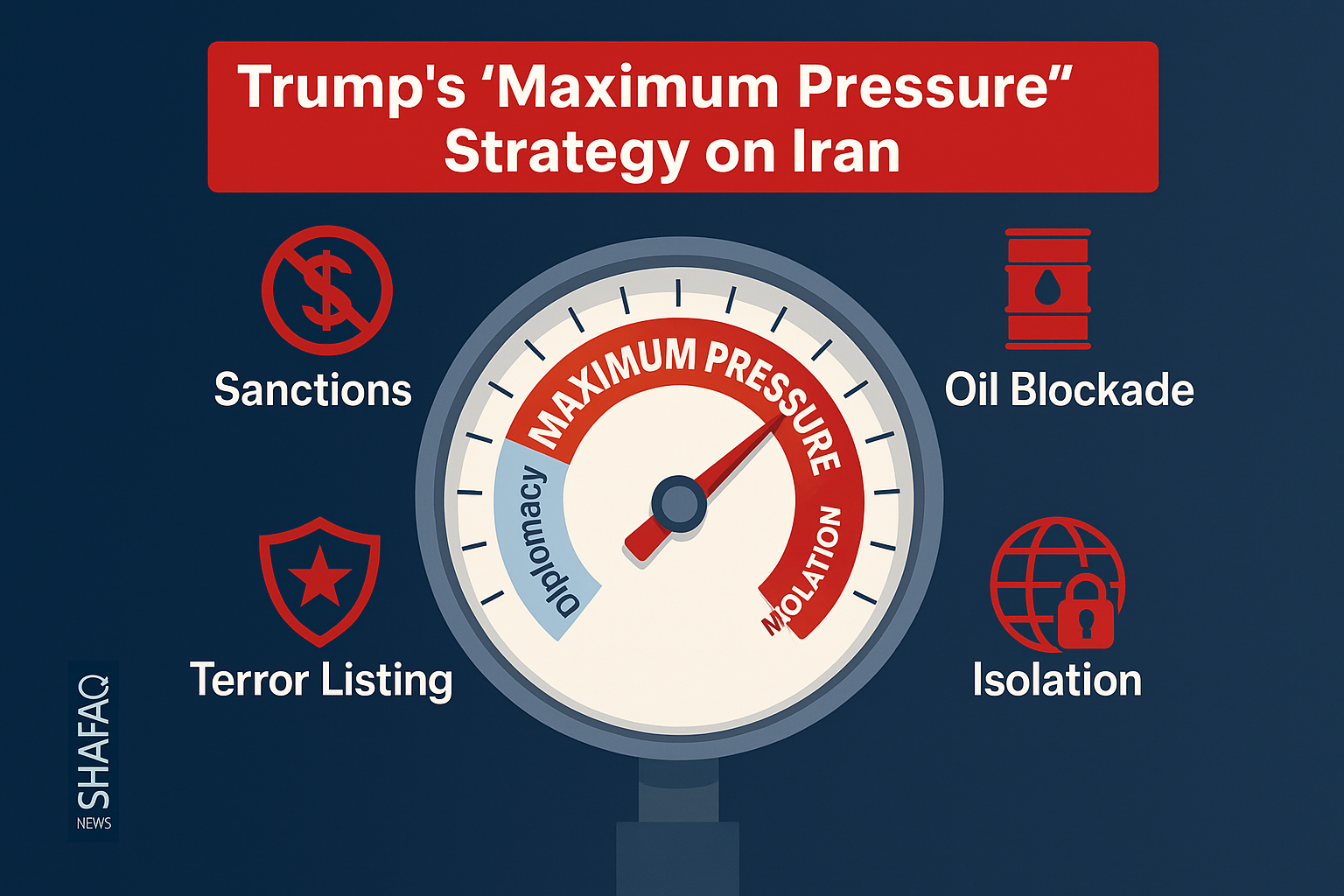
Iraq: An Indirect Battleground
As for Iraq, the US president’s strategies are seen as indirectly influential, filtered through four key factors, Al-Zughoul outlined:
-The Iranian Nuclear Agreement: A breakthrough could stabilize the region, alleviating pressures on Iraq.
-Syrian Stability: Iraq's internal militias refraining from intervention in Syria is crucial to maintaining calm.
-Diplomatic Maturity: Baghdad's ability to adopt diplomatic channels and centralize decision-making, without yielding to factional pressures, is critical in Trump's eyes.
-Regional Integration: Iraq's integration into the Arab economic and political sphere, without being held hostage to militia demands, could bolster its economy and oil exports.
"Iraq's situation is secondary," Al-Zughoul said, "depending on a broader US-Iran de-escalation and a full return of Iraq to Arab diplomatic frameworks, including Syria. Effective diplomacy and unified decision-making could even lead to a withdrawal of US forces from Iraq."
Interests and Power: Trump's Foreign Policy Doctrine
Hussein Al-Momani, Director of the Center for Strategic Studies at the University of Jordan, offered a broader lens on Trump's foreign policy. "Trump, like any traditional realist, bases foreign policy on interests and power," Al-Momani told Shafaq News.
Al-Momani explained that Trump is constructing a new international order centered on great power competition, particularly with China and Russia. "Trump seeks to neutralize Russia by offering compromises on Ukraine that might appeal to Moscow," he said.
Describing Trump as a "deal-maker," Al-Momani pointed to Trump's penchant for transactional diplomacy: trade wars, withdrawals from international bodies, and direct deals with Gulf countries and Saudi Arabia. Trump's main goal in the Middle East, Al-Momani stressed, is ensuring oil flow at reasonable prices—a strategy intertwined with Trump's Iran policy.
An Economic Creed
Ahmed Al-Yasiri, head of the Australian Arab Center for Strategic Studies, offered further insight into Trump's unconventional style. "Trump blends commercial instincts with a partial return to old American norms," he told Shafaq News.
Al-Yasiri argued that Trump rejects traditional military interventions unless necessary, focusing instead on economic leverage. "Trump's doctrine is economic: commercial investments define political partnerships, not political alliances," he said.
"Trump's trade wars impacted oil prices, affecting Iraq's rentier economy, which depends heavily on oil sales. This could trigger a financial crisis," Al-Yasiri warned.
He added that successful US-Iran negotiations could redefine the regional landscape, positioning Iran as a pivotal state but within restricted parameters. Conversely, failure could escalate tensions, risking broader regional instability, with Iraq inevitably caught in the crossfire.
Uncertain Road of US-Iran Negotiations
Discussing the broader implications of ongoing US-Iran talks, Iranian political analyst Ali Akbar Borzouni expressed skepticism about their prospects. "There are contradictory statements from US officials, and Israel is actively working to derail negotiations," he told Shafaq News.
"Trump pledged to end the Gaza and Ukraine wars, but after more than 100 days in office, the crises persist. Trump has so far failed miserably to deliver on his domestic and foreign policy objectives," he said.
The Iraqi Test: Elections as a Reflection of Regional Shifts
Analysts believe that Iraq's political future will be deeply influenced by the outcome of US-Iran negotiations and broader regional dynamics. Ahmed Al-Yasiri told Shafaq News that "the upcoming parliamentary elections, scheduled for November 11, 2025, will be a decisive moment."
According to Al-Yasiri, these elections will reflect the shifts triggered by Trump's pressure strategies and the realignments within the Middle East. "The results will reveal whether pro-Iranian forces can maintain their influence, or whether factions aligned more closely with American rhetoric will gain ground," he explained.
Thus, Iraq's internal political map stands as a direct barometer of the long-term impact of Trump’s foreign policy maneuvers and the evolving US-Iranian dynamics.
For Iraq, the impacts of Trump’s decisions remain largely indirect, hinging more on global deals and regional diplomacy than on direct US actions. The road ahead, especially with the critical 2025 elections looming, will reveal whether Baghdad can leverage diplomacy to stabilize its future amid an increasingly transactional international order.

